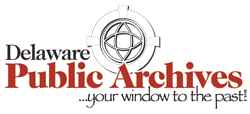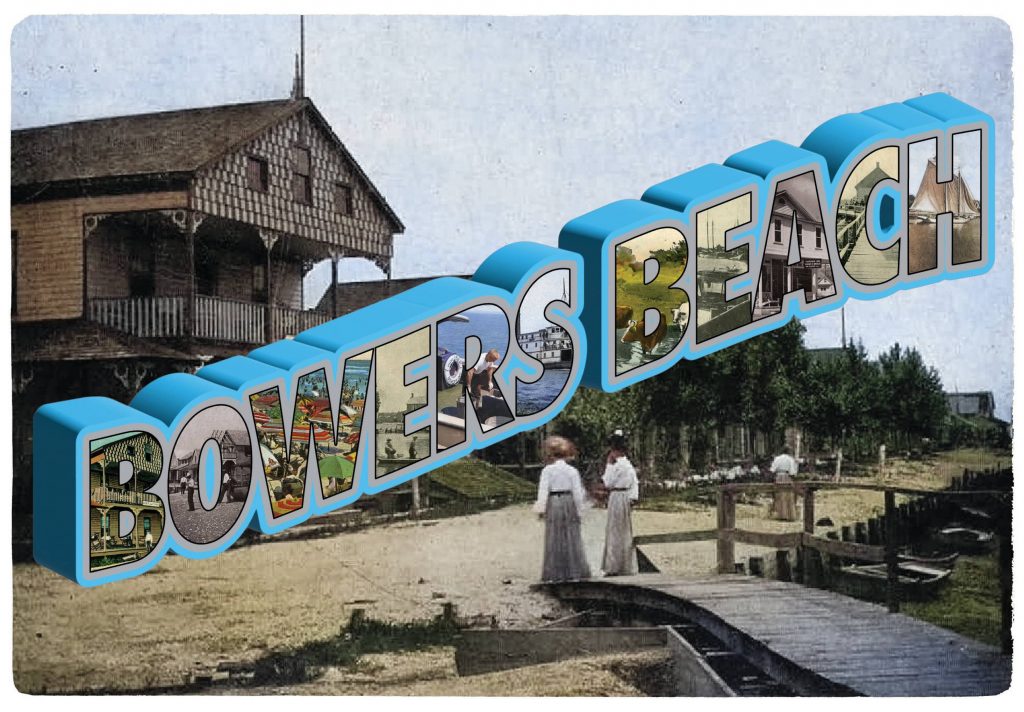

The St. Jones and Murderkill Rivers empty into the Delaware Bay only about a ½ mile apart. Located on the land which lies between the mouths of these rivers is one of Delaware’s premier fishing communities, Bowers, which was named for John Bowers, who owned the land by 1734.
The first incorporation of “The Town of Bowers” took place in 1907. The Act lays out the Town’s boundaries and indicates that these may be later formally recorded with Kent County, then appoints five men as Commissioners until new Commissioners could be elected in a year’s time. The election process was open to all males over 21 years of age. The Commissioners were to meet four times a year in order to pass ordinances for the good and welfare of the Town. They were also to elect an Alderman and a Constable who were to keep the peace, an Assessor who was to evaluate real estate and assessable personal property within the Town limits, a Treasurer, and a Town Clerk. The maximum to be levied annually in taxes for the Town was set at $1,000. In addition to levying taxes, the Commissioners were given the power to lay out and maintain the streets of the Town (assisted by Kent County who was to contribute $200 annually); and to pave sidewalks, the cost of which would be borne by the property owner. They also had the power to prevent nuisances and oversee the health and well-being of the Town as well as maintain peace and good order.1
Twenty years after the Town was incorporated, the Incorporating Act was amended to increase the maximum amount of taxes to be levied annually from $1,000 to $2,000. A special election was to be held to approve this.2 In 1949, the maximum amount of taxation levied annually was increased to $3,000; this action required referendum approval. In the same year, a Fire Marshal was appointed.3
Re-incorporation of the Town and a Charter was established in 1962. Because no annexation power had been previously awarded and no land had been annexed by a specific act of the General Assembly, the metes and bounds described matched those in the 1907 Act. No plat had been recorded but this was now required. The possibility of annexation was now acknowledged and procedures established. The Town was to be governed by a Mayor and a five-member Town Council, all of whom were required to be Town residents. The Council members were to serve staggered two-year terms, and meetings were to take place monthly. In addition to the Mayor and Council, other Town officials included a Secretary, a Treasurer, an Assessor, and a Tax Collector. An assessment was to be levied on all Town citizens over 21; the maximum amount of taxes that could be levied annually was not to exceed $10,000. The enumerated powers vested in the Council included: preserving peace and good order; laying out and maintaining streets and sidewalks as well as beach strands, wharves, jetties, embankments and boardwalks; contracting for work to enforce buildings codes, to create and enforce zoning; establishing and maintaining a sewer system; enforcing fire regulations; maintaining drainage of natural waters; and imposing fines related to obstructions, nuisances and unsanitary conditions. To assist in enforcing these powers, the Council could appoint a Police Force and act as a Board of Health. The Town was also given the power to borrow money upon approval by special election and to issue bonds for repayment of the loan.4
Over the next several years, the 1962 Charter was amended twice. In 1963, new procedures addressed the issue of collecting delinquent taxes.5 Two years later, in 1965, an amendment called for the terms of the Council members to be staggered.6 In 1972, the Town’s Charter was once again amended so that the Town Council was now to be made up of only four members, each holding a two-year term, and authorizing the position of Vice-Mayor. The law also provided for the Town of Bowers to adopt Kent County’s tax assessment values.7 In 1974, a law made several revisions to the Charter which included revising the Town’s voter registration procedure; eliminating the requirement that the Town accept the county’s assessment; establishing a requirement that all residents over 18 would be assessed; and outlining the penalty if the Mayor or members of the Town Council did not regularly attend Council meetings.8 In 1976, the day of the week on which the Town Council met was changed from a Monday to a Wednesday.9 In 1988, further revisions to the Charter penalized the Town’s Mayor and Council for unexcused absence from Council meetings. In addition, the maximum amount of taxes to be levied was changed to not to exceed 10% of the assessed value of real estate, and the maximum amount that could be borrowed was limited to $50,000.10
Amendments were made to the Charter’s procedures on tax delinquency in 2010.11 A number of changes were made to the Charter in 2018; among these were: to revise the election process and voting procedures so that they would be carried out in accordance with state regulations including lowering the voting age to 18; to make the day and time of Council meeting flexible; to no longer require the appointment of a Police force; to allow the Town to recover reasonable legal fees when bring action in court to collect delinquent taxes; to revise the procedures for abating nuisances and to allow for any costs associated with such an action to be recovered following the same method as taxes; and to empower the Town to condemn and demolish buildings deemed unsafe.12
For a fully amended text of the current Charter, see http://www.Charters.delaware.gov/bowers.shtml
CITATIONS in Del. Laws
1 24 Del. Laws, c. 207 (1907) [pp. 464-475]
2 35 Del. Laws, c. 96 (1927) [p. 282]
3 47 Del. Laws, c. 92 and c. 228 (1949) [p. 145 and p. 475]
4 53 Del. Laws, c. 279 (1962) [pp. 725-53]
5 54 Del. Laws, c. 221 (1963) [pp. 728-31]
7 55 Del. Laws, c. 210 (1965) [pp. 607-8]
7 58 Del. Laws, c. 352 (1972) [pp. 1092-94]
8 59 Del. Laws, c. 550 (1974) [pp. 1782-83]
9 60 Del. Laws, c. 304 (1976) [p. 939]
10 66 Del. Laws, c. 284 (1988) [pp. 525-26]
11 77 Del. Laws, c. 249 (2010) [vol. II, p. 36]
12 81 Del. Laws, c. 262 (2018) [http://delcode.delaware.gov/sessionlaws/ga149/chp262.shtml]
Delaware Laws from 1935 to present can be found online at http://delcode.delaware.gov/sessionlaws/
Town of Bowers records at the Delaware Public Archives include:
jnl/ April 30, 2018 | April 11, 2019